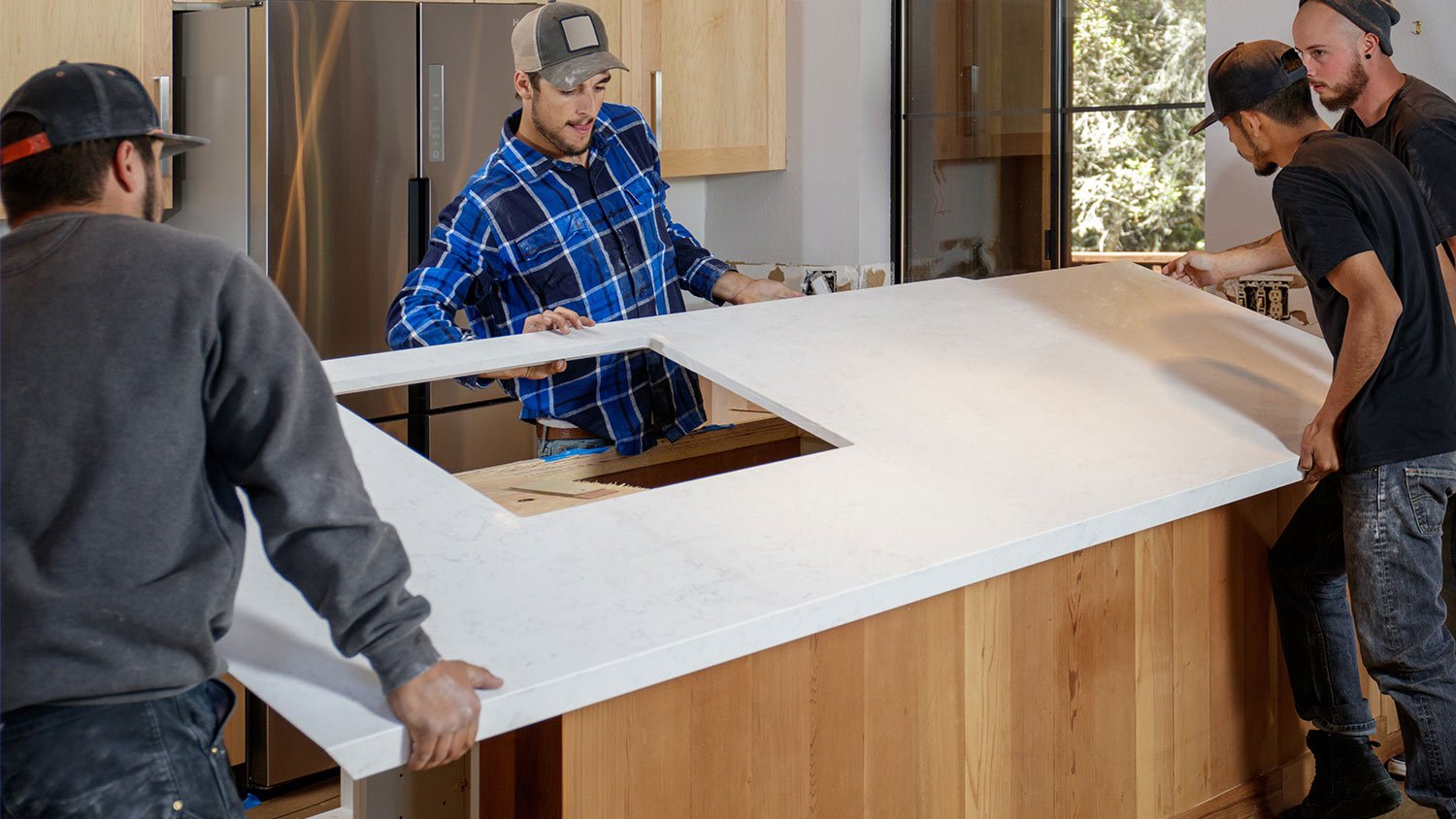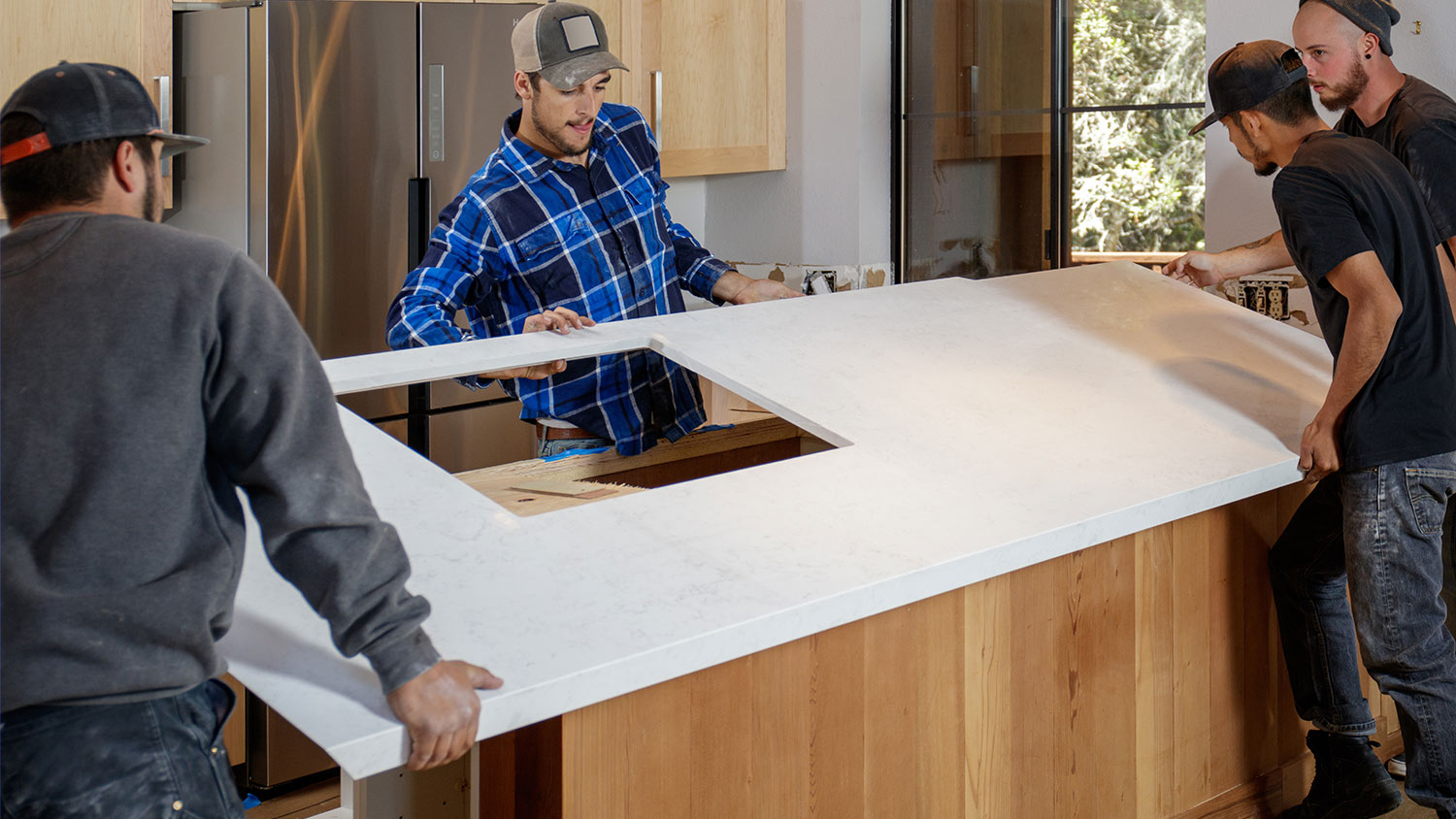
Kitchen islands are multipurpose workhorses in your kitchen. When looking to add one to your home, you should consider its size, materials, and its primary use in your home. Learn about the price of kitchen islands and their different features.
Check your countertop contractor’s qualifications before signing on the dotted line


When it comes to remodeling, installing countertops in your kitchen or bathroom is one of the trickier DIY projects. And while, sure, you could paint the countertops as a temporary solution to buy you a few years before replacing them entirely, at some point, you’ll probably want to go all-in with brand-new countertops. But how do you know what stone to pick and who to call for the job? Countertops contractors can help you with everything from design to fabrication to installation.
New countertops are typically very large, heavy slabs of rock or fabricated material. The sheer force it takes to a 1 3/4-inch chunk of thick stone may require special equipment and a couple sets of hands to move. The shaping and cutting of countertops also require heavy-duty machinery and a lot of space, in addition to having a truck to transport it once it’s cut.
Here are a few reasons why you’ll want to hire this home improvement project out to a countertop contractor:
Transport: You’ll need at least three capable individuals to move a slab of countertop from a warehouse to your house.
Tools: The specialized machinery—stone saws, polishers, and routers—that countertop contractors use are well beyond what is found in a typical DIYer’s toolkit.
Insurance: Reputable contractors are licensed and insured, in the event of an on-the-job accident.
Liability: They are responsible for the countertop deliverables and installation quality.
Installing countertops is a multi-step process. Contractors start by removing fixtures to make room for the new countertop. Next, they assess the cabinets to ensure they are level and stable. After that, a contractor will usually take precise measurements. They’ll take these measurements off-site to fabricate the materials into the correct size and shape. This is sometimes done on-site.
Contractors will use epoxy or construction adhesive to secure the slabs on the cabinets and then join the seams with epoxy that matches the countertop color. If needed, a backsplash and a sink cutout will follow. The final steps include sealing and the installation of required hardware, such as faucets and sink accessories.
Installing kitchen countertops costs anywhere from $400 to $10,675, depending on the materials, edging, overall size and related factors. The average countertop installation cost is $3,100. Ceramic countertops tend to be the most budget-friendly, ranging from $1 to $15 per square foot. On the other side of the glamor spectrum, marble countertops cost up to $190 per square foot. Common countertop materials like granite, quartz, and laminate lie in the middle of the cost range.
This can be a DIY-friendly job, but only in specific instances. Installing prefabricated countertops made of lighter materials like laminate or wood is doable if you have woodworking tools and the skills to use them.
However, most materials aren’t DIY-friendly. Countertops made from granite, quartz, and marble are too heavy for a DIY install. These jobs require all kinds of specialized tools and plenty of expertise. It’s all too easy to damage the countertop during the installation phase, which would be a massive hit to your budget. If you’re unsure if the job is DIY-friendly, contact a pro for advice.
Finding a countertop pro can seem daunting, but there are several ways to get a referral if you don’t know where to start. Asking for word-of-mouth referrals from neighbors or friends is an excellent way to generate an initial list. You can also use Angi’s extensive database of professionals to find a countertop installer near you.
I was blown away by the experience of working with a pro who is honest down to their bones, cares about the quality of their work down to the smallest details, is a phenomenally good carpenter with a small crew of stellar, hard-working people they trained themselves, was spot-on with every time estimate and cost estimate—and for all of this is relaxed and warm at the same time.
— Suzanne S., Marvel Homes, Boulder, CO
Before hiring a countertop installation company, you’ll want to check off the following steps:
Having accurate kitchen measurements of your surfaces before you get a quote will go a long way toward helping you ascertain some of the many options you’ll have for materials and installation costs. Additionally, if you plan to add an island or modify the current countertops from their original shape, you’ll want to have a rough idea of what you want drawn up before reaching out to contractors.
If you’re managing the entire project and intend to hire and oversee multiple subcontractors—like painting, flooring, or cabinet companies—you need to outline a plan to achieve your vision. Here are a few things to map out in your countertop plan:
Total square footage of countertops
Size and type of your kitchen sink
General, top-down dimensional plan of the room, including windows and door openings
Desired style of cabinets
Flooring
Paint color, sheen, and material you want for cabinets and walls
Don’t just go with the first countertop installer you find, but get three competitive quotes from different pros to make sure that you have a high level of confidence in their communication with you, attention to detail, and a solid timeline for completing the work.
Licensing, insurance, and bonding are important metrics in determining whether or not your countertop installer is a reputable professional.
Ask for a list of references of the countertop installer’s past customers or, if you know someone who has used the company, inquire directly about their experience. Did the company finish the job on time and on budget? Was their communication timely and thorough? Was the past client happy with the finished result?
A professional contractor or home renovation company should have a website or portfolio of completed projects readily available or, at the very least, will have been reviewed online via search engines. Request a link or access to images from past projects; before-and-after photos, in particular, will show you a lot about the caliber of work you can expect from that countertop company. If possible, visiting completed job sites to see the work in person will help ensure the quality is up to your expectations.
When interviewing a countertop installer, here are a few questions to ask to help you make your final pick:
Can you show me pictures of completed projects you’ve done?
What is the process to pick out materials?
How do you base your pricing (e.g., square feet or per project)?
How long will it take to complete the job from the time I’ve chosen the stone and signed off on a contract?

"The biggest misconceptions about kitchen remodeling are how long it takes and how much mess it creates when we tear everything out. People go in there to grab things and track dirt around the home. Living without a kitchen sink quickly becomes inconvenient. If we’re going to put a whole new kitchen in, we cut the countertop off on each side of the sink and leave the sink base and dishwasher hooked up during the entire process. That way, you don’t have people washing dishes out of their tubs or anything like that."
— Ken Bennett, General Contractor, Home Experts, LLC
It’s essential to go with your gut and trust any vibe you’re getting from your interactions with a professional countertop installer. If you’re not getting clear answers to your questions about materials, process, and scope, you’ll likely want to move on to the next candidate.
A basic internet query of the countertop contractor’s name or company is the first step in doing your research—but it shouldn’t stop there. Before you start making calls to schedule a meeting, look into their state license certifications by contacting the relevant organizations directly.
Before proceeding with any home renovation job, you’ll want a contract you’re comfortable with. To fully cover your bases: The down payment, payment structure, final payoff, materials, and a loose timeframe for installation are all things that should be agreed upon before signing a construction contract with a countertop professional.
Besides maintaining a clear line of communication about the expectations of work with your contractor, you’ll also want to keep receipts so that there are no misunderstandings. Often, countertop installers will have you purchase the stone slab on your own and have it shipped to their manufacturing facility, for example, and you’ll want to ensure that you have a record of that.
Early signs of communication difficulties between you and the contracting professional are good indicators that you might have more problems down the road with the project. Also, first impressions matter: If they don’t show up on time for your initial meeting or can’t produce references or photos of past projects immediately upon request, you might want to take a pause and re-bid the project to another company.
Once the countertops are in, check the installation thoroughly for good workmanship before writing a final check. This includes ensuring that the stone is perfectly polished, the edges abutting the backsplash are cleanly caulked, and the sink has been properly secured to the countertop.
If you are satisfied with the completed job and would recommend working with your countertop installation company, pay it forward and let them know you’d like to be a reference in the future.
From average costs to expert advice, get all the answers you need to get your job done.

Kitchen islands are multipurpose workhorses in your kitchen. When looking to add one to your home, you should consider its size, materials, and its primary use in your home. Learn about the price of kitchen islands and their different features.

Granite counters are durable and stylish, but if you’re wondering how much granite countertops cost, it’s time to dig into the details.

Discover cabinet installation cost estimates, including average prices, key cost factors, and tips to save on your new kitchen or bathroom cabinets.

Mystified by countertop edges? We discuss eight countertop edge types, their pros and cons, and costs. Learn which countertop profile is best for your kitchen.

If your kitchen needs a facelift, you can give your outdated counters a new life by learning how to paint Formica® countertops.

Discover the best outdoor kitchen countertop ideas. From durable granite to sleek concrete, find the perfect match for your taste and budget today.